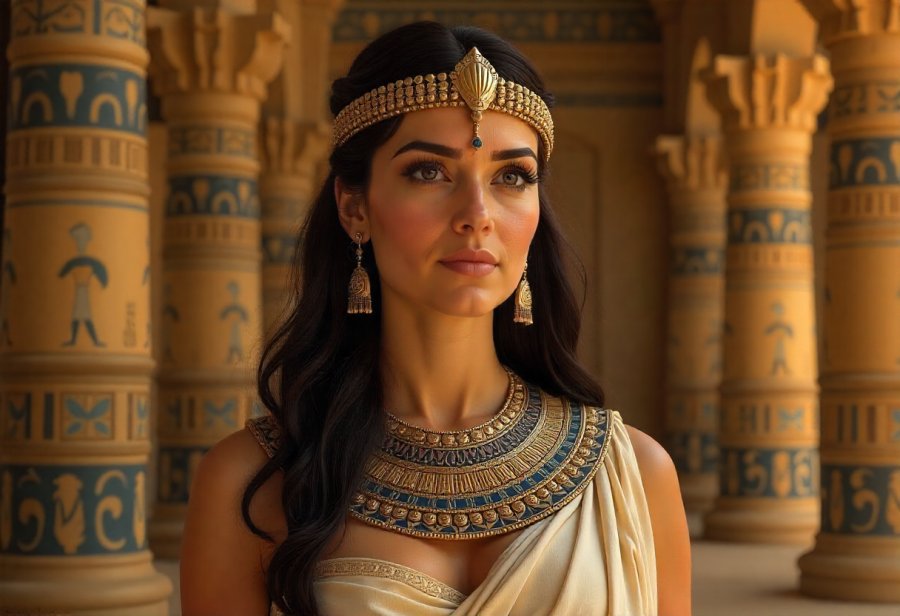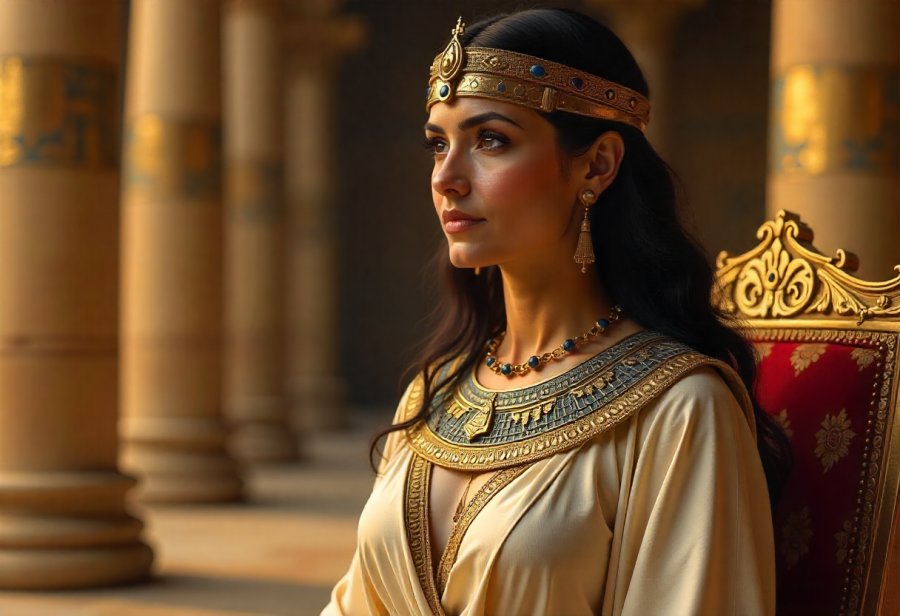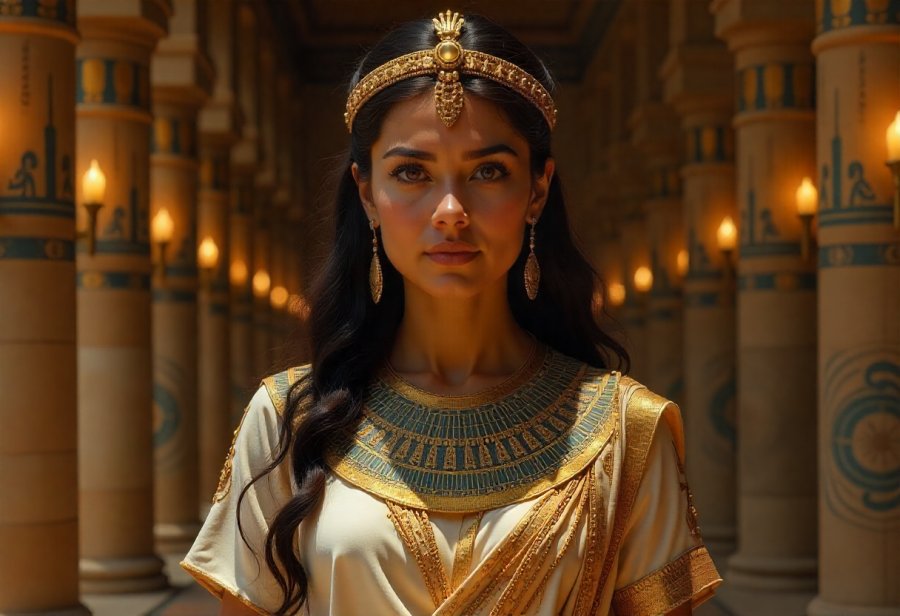
Cleopatra VII is often remembered through romanticized images, but her true legacy lies in her remarkable intellect and diplomatic mastery. As Egypt’s last pharaoh, she navigated turbulent political waters with multilingual prowess, cultural savvy, and strategic alliances, notably with Julius Caesar and Mark Antony. Her leadership was rooted in understanding the complex interplay of religion, culture, and diplomacy, using divine symbolism and scholarly pursuits to legitimize her rule. Far from a mere seductress, she was a visionary who prioritized wisdom, resilience, and cultural insight—traits that helped her defend Egypt’s independence amid Roman expansion. Today, her story challenges stereotypes, inspiring modern leaders—especially women—to value intelligence and strategy over superficial charm. Could her influence be a timeless blueprint for leadership rooted in knowledge and cultural fluency? Her legacy endures as a testament to how influence of the mind can shape history long after the throne is gone.

Unveiling Cleopatra VII: The Scholar-Queen with a Sharp Mind and Diplomatic Flair
Cleopatra VII is often remembered through Hollywood’s lens as a seductive queen, but her true power was rooted in her sharp mind and political skill. As the last active ruler of Egypt, she navigated a complex landscape of shifting alliances, internal rivalries, and external threats with remarkable finesse. Her education was extensive—she spoke multiple languages fluently, including Egyptian, Greek, Latin, and others—allowing her to communicate directly with diverse audiences and forge strategic connections. This linguistic mastery was a vital tool in her diplomatic arsenal, helping her build alliances that kept Egypt afloat during Rome’s expanding influence.
Far from the romanticized image of a love-struck monarch, Cleopatra’s legacy is built on her intelligence and political acumen. She understood that real power in the ancient world depended more on wit, strategy, and cultural diplomacy than on beauty alone. She was a scholar-queen, deeply engaged with philosophy, science, and the arts, which equipped her to craft alliances and navigate court politics with subtlety. Her relationships with Julius Caesar and Mark Antony weren’t just about romance—they were carefully calculated moves to protect Egypt’s independence and influence.
Her leadership was shaped by a keen understanding of her kingdom’s unique position—caught between tradition and foreign influence. The Macedonian Greek Ptolemaic dynasty she belonged to had ruled Egypt for centuries, blending Greek customs with Egyptian religious and cultural practices. Cleopatra used her intelligence and cultural awareness to legitimize her rule, employing religious symbolism and traditional ceremonies. She often aligned herself with Egyptian gods like Isis to connect with her people on a spiritual level, reinforcing her divine authority.
Beyond political strategy, Cleopatra was a dedicated scholar and patron of learning. She supported the Library of Alexandria, one of the ancient world’s greatest centers of knowledge, and engaged with scholars across disciplines. Her love of learning and curiosity complemented her leadership style, making her not just a ruler by birthright but a figure who valued wisdom and education. This intellectual foundation helped her interpret religious symbols, craft cultural narratives, and use her knowledge as a diplomatic tool—traits that set her apart from many of her contemporaries.
What truly distinguished Cleopatra was her awareness that genuine power lay in her ability to think strategically, adapt quickly, and understand the cultures and minds of those around her. Her multilingual skills and familiarity with Egyptian religious rituals gave her legitimacy as a divine ruler, while her diplomatic finesse allowed her to outmaneuver rivals and secure her position. Her leadership was a testament to the idea that influence in the ancient world was as much about intellect and cultural insight as it was about military might or personal charm.
Navigating a Tumultuous Egypt: Cleopatra’s Strategic Rise Amidst Political Turmoil
During Cleopatra’s reign, Egypt was a land rich in tradition but fraught with political instability. The Ptolemaic dynasty, established by one of Alexander the Great’s generals, had ruled for nearly three centuries, blending Greek customs with Egypt’s ancient religious and cultural practices. This fusion created a vibrant yet complex society, caught between the old ways and the influence of foreign rulers. Despite Egypt’s wealth and cultural achievements, its political landscape was fragile and constantly shifting.
Rome’s expanding power across the Mediterranean cast a long shadow over Egypt’s independence. Cleopatra inherited a kingdom that was both prosperous and vulnerable, with internal factions vying for influence and external threats looming. Her early years were marked by a fierce struggle to establish her authority, especially against her younger brother Ptolemy XIII, with whom she initially co-ruled. Recognizing that survival depended on external support, she sought alliances with influential Roman figures, understanding that diplomacy was key to her kingdom’s future.
Egypt’s cultural fabric reflected the blending of Greek and Egyptian elements. Temples, rituals, and social norms carried traces of Hellenistic influence, yet traditional Egyptian religious beliefs remained central to daily life. Cleopatra mastered these cultural nuances, using religious symbolism and ceremonies to legitimize her rule. She aligned herself with Egyptian gods like Isis, connecting with her people on a spiritual level and reinforcing her divine authority amid political turbulence.
Her rise to power involved strategic moves that balanced internal stability with external diplomacy. After her father’s death, Cleopatra moved swiftly to secure her throne, leveraging her intelligence, multilingual skills, and diplomatic finesse. Her alliances with Julius Caesar and later Mark Antony weren’t accidental—they were deliberate efforts to strengthen Egypt’s standing and defend its sovereignty amid Rome’s growing influence.
Throughout her reign, Cleopatra understood that external influence was unavoidable. She skillfully navigated the complex landscape of alliances, using her cultural awareness and political acumen to maintain Egypt’s independence longer than many expected. Her ability to adapt to shifting circumstances, while embracing her Egyptian identity and Greek heritage, made her a resilient leader who could keep her kingdom afloat amid formidable odds.
Her leadership was deeply rooted in her understanding of Egyptian religious traditions and cultural symbols. She employed religious rituals and divine imagery to legitimize her authority, often aligning herself with gods like Isis to reinforce her divine right. This cultural diplomacy allowed her to inspire loyalty and unity among her people, even during times of external threat or internal unrest.
Cleopatra’s mastery of internal politics and external diplomacy set her apart as a ruler who could wield influence beyond mere military might. Her strategic alliances, cultural insight, and ability to read the shifting tides of power made her a formidable figure in history. Her reign exemplifies how a leader’s true strength often lies in understanding and navigating the complex web of cultural, religious, and political forces at play.

The Power of Wisdom and Diplomacy: Cleopatra’s Enduring Influence and Cultural Mastery
Cleopatra’s intelligence and diplomatic finesse were the backbone of her enduring influence. She understood that true leadership relied on more than just military prowess; it required a keen grasp of politics, culture, and human nature. Her mastery of multiple languages—Egyptian, Greek, Latin, and others—enabled her to communicate directly with diverse audiences, forging trust and minimizing misunderstandings. This linguistic versatility was a powerful tool in her diplomatic toolkit, allowing her to negotiate, persuade, and build alliances with remarkable skill.
Her deep knowledge of Egyptian religious traditions further strengthened her position. By aligning herself with gods like Isis and participating in sacred rituals, Cleopatra connected her authority to divine legitimacy, inspiring loyalty among her subjects. She skillfully blended religious symbolism with political strategy, reinforcing her role as both a spiritual and political leader. This integration of faith and power made her a unifying figure, capable of inspiring devotion and stability during turbulent times.
Beyond external diplomacy, Cleopatra was a shrewd observer of court politics. She understood the importance of internal loyalty and used marriage alliances, political appointments, and patronage to secure her influence. Her ability to read shifting power dynamics and respond swiftly kept her ahead of rival factions. Her resilience lay in her capacity to adapt to changing circumstances, always maintaining a strategic edge that prolonged her reign.
Her leadership was characterized by a sophisticated understanding of cultural nuances. She employed religious and cultural symbols to legitimize her authority, often emphasizing her divine right through Egyptian iconography while embracing her Greek heritage. This cultural diplomacy allowed her to unify her people and maintain stability, even amid external threats from Rome and internal unrest.
Cleopatra’s legacy demonstrates that influence in the ancient world was rooted in wisdom, adaptability, and cultural insight. Her ability to craft alliances through negotiation, language, and symbolism exemplifies a leadership style that prioritized intelligence over brute force. Her story continues to serve as a powerful reminder that true power often resides in the mind—an influence that can shape history long after the throne has been lost.
Her example challenges modern notions of leadership, illustrating that cultural literacy, strategic negotiation, and resilience are as vital today as they were in her time. Cleopatra showed that leadership rooted in intellect and diplomacy can be more enduring than conquest or charm alone. Her legacy underscores the timeless truth that influence built on knowledge and understanding creates a foundation for lasting impact, inspiring generations of leaders to prioritize wisdom and cultural awareness in their pursuit of power.
Her ability to leverage cultural symbols and diplomatic skills underscores the importance of strategic communication in leadership. For those interested in exploring how historical figures like Cleopatra utilized language and cultural mastery to shape their legacies, learning about Cultural Diplomacy and Its Role in Leadership can provide valuable insights into modern applications of these timeless principles.
Redefining Leadership: Modern Perspectives on Cleopatra’s Intellectual and Diplomatic Legacy
Cleopatra’s story still resonates today, especially as we rethink what it means to be a female leader. For centuries, her image has been reduced to that of a seductress, but modern perspectives shine a spotlight on her as a strategic thinker and master diplomat. She understood that true influence stemmed from intelligence, cultural insight, and the ability to navigate complex political landscapes. Today’s women leaders often look to her example, demonstrating that strength and wisdom go hand in hand.
Contemporary portrayals—whether in films, books, or academic discussions—shift focus from her beauty and romantic exploits to her sharp mind and resilience. These stories emphasize her multilingual skills, diplomatic finesse, and cultural savvy—traits that helped her maintain power despite external threats. Such narratives challenge outdated stereotypes, positioning Cleopatra as a symbol of empowerment for women who lead with intelligence and strategic insight.
Her legacy also shapes modern ideas about leadership qualities. Cleopatra’s ability to adapt, learn, and build alliances shows that effective leadership depends on understanding others and responding thoughtfully to different perspectives. Women in power who excel in diplomacy and strategic planning often see her as an inspiration, highlighting that influence relies on knowledge, cultural literacy, and resilience. Her example underscores that genuine authority is rooted in the mind, not just personal charm or force.
As attitudes about women in leadership evolve, Cleopatra’s story offers a broader view of what strength looks like. Today, she’s celebrated not just for her historical role but for embodying qualities—wisdom, resilience, cultural awareness—that remain vital. Reframing her as a figure of strategic brilliance and intellectual power provides a richer, more accurate picture of her influence. Her life reminds us that leadership rooted in knowledge and adaptability has lasting power.
Looking ahead, her example encourages future leaders to prioritize education, multilingual skills, and cultural understanding. These qualities foster genuine connections and trust across diverse groups, much like Cleopatra’s diplomatic approach. In an increasingly interconnected world, her legacy teaches that influence built on wisdom and cultural insight can transcend borders and time, shaping resilient, forward-thinking leadership models.
Her story continues to inspire not just historical admiration but practical lessons for today’s evolving leadership landscape. As societies face new challenges, Cleopatra’s emphasis on learning, diplomacy, and resilience remains relevant. Leaders who embrace her example—valuing knowledge over superficial charm—are better equipped to navigate complexity and foster lasting impact. Her influence proves that the most enduring leadership is driven by the strength of the mind and the ability to adapt.
Ultimately, Cleopatra’s legacy reminds us that real power lies in understanding others, embracing knowledge, and leading with strategic insight. Her life remains a blueprint for leadership that is inclusive, resilient, and wise—qualities that will shape the leaders of tomorrow. Her story encourages us to see influence not as a fleeting attribute but as a lasting force rooted in intellectual strength and cultural fluency.

Looking Forward: How Cleopatra’s Principles Shape Future Leadership and Influence
Cleopatra’s legacy offers compelling lessons for how leadership can evolve in the modern world. Her example highlights that intelligence, cultural awareness, and strategic thinking are just as crucial—if not more so—than traditional displays of power. Today’s leaders who prioritize continuous learning, multilingual abilities, and cultural literacy can forge deeper connections across diverse groups, much like Cleopatra did in her time. These qualities enable them to navigate the complexities of today’s interconnected societies with agility and subtlety, ensuring influence is rooted in understanding rather than force.
Her mastery of diplomacy underscores that influence depends on empathy, perspective-taking, and the ability to build trust. Moving beyond superficial charm or authority, leaders who genuinely understand different cultural and social contexts can foster loyalty and cooperation. Cleopatra’s knack for adapting swiftly to shifting circumstances exemplifies resilience—an essential trait for addressing today’s unpredictable global challenges. Her focus on relationship-building and cultural insight remains relevant as a blueprint for effective leadership in an era of rapid change.
In a world where collaboration and inclusion are increasingly valued, Cleopatra’s approach advocates for long-term relationship cultivation over short-term gains. Leaders embracing her principles may prioritize stability, sustainability, and mutual respect—traits that foster trust and resilience. Her example encourages a shift towards leadership models that emphasize wisdom, patience, and strategic foresight, qualities vital for guiding societies through uncertain times.
Women in leadership today find particular inspiration in her story. Cleopatra’s influence rooted in intellect, cultural literacy, and diplomacy challenges outdated stereotypes that equate power with force or superficial charm. Her legacy demonstrates that true authority stems from skills, resilience, and strategic insight—traits accessible to anyone committed to growth and learning. As more women ascend to prominent roles worldwide, her example validates the importance of cultivating knowledge and cultural understanding as central to lasting influence.
Looking ahead, her life prompts a reevaluation of what effective leadership entails. Authority no longer relies solely on position or charisma but increasingly on the capacity to adapt, learn, and bridge divides. Leaders who emphasize education, linguistic skills, and cultural sensitivity will be better equipped to build trust and foster collaboration across borders. Cleopatra’s model shows that influence rooted in the strength of the mind can transcend political boundaries and remain impactful through changing times.
Her story remains a powerful blueprint for future leadership. It underscores that lasting influence is built on understanding others, embracing continuous growth, and leading with resilience and wisdom. In an increasingly complex world, Cleopatra’s example reminds us that the true power of a leader lies in their ability to adapt, learn, and inspire trust through cultural insight. Her legacy persists as a testament to the enduring strength of intelligence and strategic thinking—traits that will shape the leaders of tomorrow and beyond.



